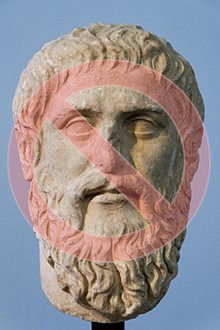Peace and Safety For Your Twentieth of September – Epicurus vs. Plato – Part 1 – “Gorgias”
It is my view that one of the most important things we can do to better understand Epicurus is to study the majority opinion of the leading philosophers who came before him. Epicurus would have done so himself, and prepared his doctrines in response to them and to vaccinate his students against the errors of those who found “the good” in something other than the faculty given to us by Nature for choice: pleasure. There are a number of key sources by which we can determine the issues that confronted Epicurus, and among the most important of them are the works of Plato (especially Gorgias, Philebus, and Timaeus) As a secondary source we can also refer to the summaries compiled later by Cicero in “On Ends.”
Over time I hope to go through these in detail, and link to the responses in the Epicurean texts, but for this post I have only been able to start – this time with a brief outline of major points of relevance made by Plato in Gorgias. Here we find a number of Plato’s main attacks on pleasure. These very same arguments would have been before Epicurus, and he must have been compelled time and again to address them.
For this post I only have time to provide a list of references to locations where the points are made in the text. Given what we know of Plato’s own opinions and goals, whenever we see points like these being made, we should be suspicious that they constitute the bricks in the wall mainstream philosophy has erected against Epicurean doctrines:
Find all these at the page linked here.
Definition of “flattery”
Everything is either good or evil or indifferent (note the neutral state)
The Greatest Evil is Doing Injustice
A thing is good when just and evil when unjust.
Good people are happy and evil people are miserable.
The unjust are more miserable if they are not punished.
The beautiful as the standard.
He who is punished suffers what is good.
Evil in the soul is the most disgraceful thing
Injustice and intemperance are the greatest of evils
Justice gives the greatest pleasure.
Injustice is the greatest of evils
To suffer punishment is to be released from evil.
To do wrong and not be punished is the greatest evil.
The better is the wiser.
The leaky cask analogy.
It is shameful not to distinguish between good and bad pleasures.
Pleasure is not good because it requires pain (drinking requires thirst)
Good is not the same as pleasant and pain is not the same as evil.
All actions are done for the sake of the good.
Pleasure ought to be sought for the sake of the good.
It is agreed that good and pleasure are different.
Order is good and disorder is evil.
Health is regular order of the body (harmony)
Restraint is better for the soul than intemperance.
The good man must be temperate and just.
To do evil is worse for the doer than to suffer evil for sufferer.
To advocate pursuit of pleasure is vulgar flattery.
Good men should try to make other citizens as good as possible – not please them.
No man becomes good by pursuing pleasure.
After death we will be judged according to our virtue.
I hope you find this list of links useful, as thinking about the Epicurean response to each of these would be a great exercise.
________
As Seneca recorded: Sic fac omnia tamquam spectet Epicurus! So do all things as though watching were Epicurus!
And as Philodemus wrote: “I will be faithful to Epicurus, according to whom it has been my choice to live.”
Additional discussion of this post and other Epicurean ideas can be found at the Epicurean Philosophy Facebook Group and EpicureanFriends.com

